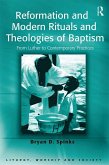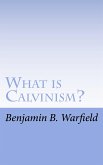To my argument several critics object, that all sorts of serious errors are modifications of New Testament teaching, and that my proof of Infant Baptism is overturned by my own disproof of Baptismal Regeneration. But I have endeavoured to show that, whereas this last doctrine contradicts utterly the broad principles of the New Covenant, the practice of Infant Baptism is in complete harmony with them and with still broader principles underlying both Old and New Covenants. This complete difference robs their reply of all force. I have also shown that Infant Baptism embodies in the best mode an all-important truth needing ever to be kept in view, which if not thus embodied would leave the New Covenant in one important point inferior to the Old. These arguments, the critics referred to have overlooked. Their oversight implies that we are bound to reproduce to the letter the forms of Church life described in the New Testament. This silent assumption marks the difference between their standpoint and mine. And on this ground the whole question must be decided. Is Christianity a life adapting itself, in harmony with its own vital principles, to its varying environment? Or is it a verbal prescription admitting of no development and adjustment?
Fortunately, as I have shown in Section ii., our Baptist brethren are illogical. Otherwise they would need to reconstruct the polity of their own Churches. For there is nothing like a solitary pastorate in the New Testament. And it is a serious modification of the Church polity there described. This modification, however, which our brethren have long retained as suited to their needs, I have endeavoured to justify, on the principles advocated in this treatise.
So far as I have seen, no critic has ventured to deal with my argument about the Lord's Day.
My readers must judge whether, as Dr. Clifford implies in a paper in the British Weekly, Infant Baptism as I have expounded it is "practically destructive of New Testament Baptism and fearfully generative of the errors of Baptismal Regeneration." But I greatly rejoice to hear from him that the Church over which he presides practises "the dedication of children in the presence of the congregation (or at home) to God our Father, in recognition of His redeeming love, and of our obligation as Christians to train them in a knowledge of its sweetness and power." May such recognition become universal in the Baptist Churches. To whatever extent it prevails, it is a debt due to the Churches which during long centuries have baptized infants.
May such mutual indebtedness greatly increase, each Church borrowing from all others whatever good they possess, that thus the blessings conferred upon one Church may become an enrichment to all.
As this leaves my hand I have received a Handbook of Scriptural Church Principles published at the Wesleyan Book Room. I observe with pleasure, so far as a hasty perusal will permit, that its exposition of Christian Baptism is practically the same as that which I have here given. The whole chapter is worthy of careful study.
Richmond, 7th September, 1888.
CrossReach Publications
Dieser Download kann aus rechtlichen Gründen nur mit Rechnungsadresse in A, B, BG, CY, CZ, D, DK, EW, E, FIN, F, GR, H, IRL, I, LT, L, LR, M, NL, PL, P, R, S, SLO, SK ausgeliefert werden.









